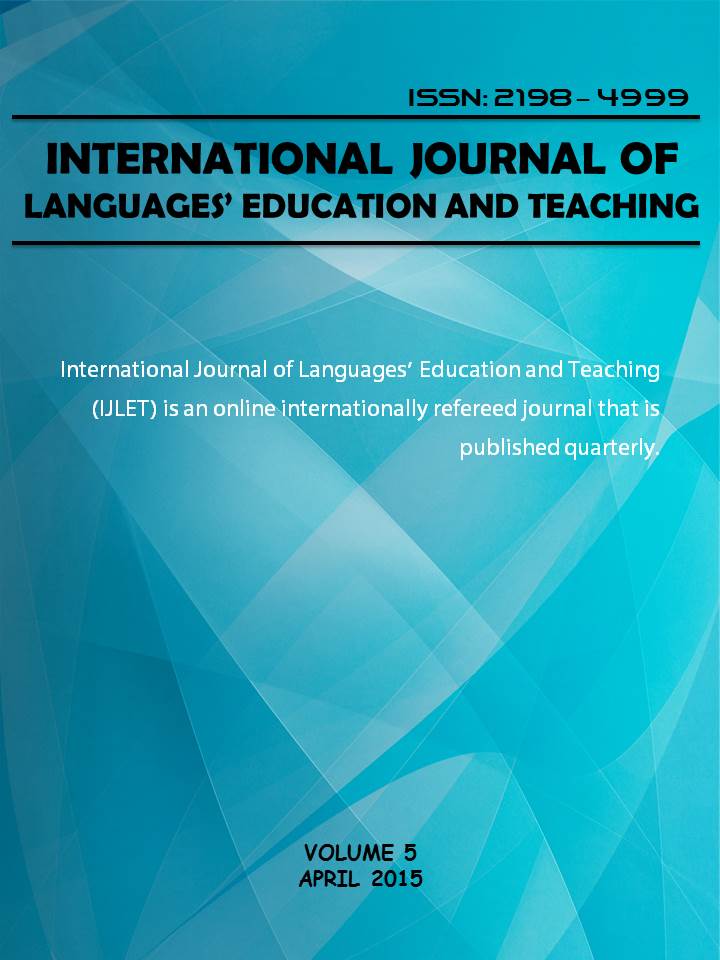Author :
Abstract
Keywords
Abstract
Education plays a crucial role in the development of a country and teachers have a key role in shaping the future of the country. Education aims are both academic and social. Qualified teachers, equipped with the latest pedagogic techniques will encourage the economic development and future welfare of Turkey. By keeping pace with the challenges of globalisation in the competition-centred world, and at the same time, preserving Turkish cultural assets, this teaching force must develop by espousing not only Turkish national culture with its values, but also include other cultures. This can be possible only through a well-qualified education progress. The various functions of education have increased by constant advancements in technology and science. In the pursuit of quality education, studies have been conducted to investigate the problems in different fields such as Maths, Sciences, Social Sciences, Art, and Language, and so on. In this paper, foreign language education, particularly English language education is taken into consideration. The purpose of this paper is to describe and analyse English language teacher education practices in Turkish context. The paper includes some parts to present a meaningful order. It will initially discuss the general overview of the education system in Turkey including the foreign language policy. Next, foreign language teacher’s education in Turkey will be chronologically presented, and then a critical analysis of the current practices in terms of strengths and weaknesses will be analysed. Finally, some reformist recommendations for the current situation will be offered to describe how foreign language teacher education would be if teachers were given opportunities to do so.
Keywords
- Aksit, N. (2007). Educational reform in Turkey. International Journal of Educational Development, 27, 129-137. doi:10.1016/j.ijedudev.2006.07.011
- Akyuz, Y. (2008). Türk Eğitim Tarihi: M.Ö. 1000 – M.S. 2008. Ankara: Pegem Akademi.
- Altan, Z. K. (1998). A call for change and pedagogy: A critical analysis of teacher education in Turkey. European Journal of Education, 33(4), 407-417. Retrieved from http://www.jstor.org/stable/1503396
- Aydogan, I., & Cilsal, Z. (2007). Yabancı dil öğretmenlerininz yetiştirilme süreci (Türkiye ve diğer ülkeler). Sosyal Bilimler Enstitüsü Dergisi, 22(1), 179-197.
- Borg, S. (1999). Studying teacher cognition in second language grammar teaching. Elsevier Science Ltd., System, 27, 19-31.
- Burns, A., & Richards, J. C. (2009). Second language teacher education. In A. Burns & J.C. Richards (Eds.), The Cambridge Guide to Second Language Teacher Education (pp. 18). New York: Cambridge University Press.
- Demirel, O. (1995). A model for teacher education curricula in Turkey. Hacettepe University Education Faculty Journal, 11, 91-97. Retrieved from http://www.efdergi.hacettepe. edu.tr/199511%C3%96ZCAN%20DEM%C4%B0REL.pdf
- Grossman, G. M., Onkol, P. E., & Sands, M. (2007). Curriculum reform in Turkish teacher education: Attitudes of teacher educators towards change in an EU candidate nation. International Journal of Educational Development, 27, 139-150. Retrieved from http://dx.doi.org/10.1016/j.ijedudev.2006.07.005
- Gursimsek, I., Kaptan, F., & Erkan, S. (1997, March). General view of teacher education policies in Turkey. Paper presented at the 49th American Association of Colleges for Teacher Education (ACCTE) Annual Meeting, Phoenix, Arizona, USA. Retrieved from http://www.eric.ed.gov/PDFS/ED406359.pdf
- Hawkins, M., & Norton, B. (2009). Critical language teacher education. In A. Burns & J. C. Richards (Eds.), The Cambridge Guide to Second Language Teacher Education (pp. 3039). New York: Cambridge University Press.
- Higher Education Institute (YÖK). (2007a). Teacher Education and Education Faculties: 1982- 2007. Ankara: Yükseköğretim Kurulu.
- Huberman, M. (1989). The professional life cycle of teachers. Teachers’ College Record, 91, 31- 57.
- Isik, A. (2008). Yabancı dil eğitimimizdeki yanlışlar nereden kaynaklanıyor? Journal of Language and Linguistics Studies, 4(2), 15-26. Retrieved from http://www.jlls.org/ Issues /Volume%204/No.2/aisik.pdf
- Kachru, B. B. (1992). The other side of the English and the 1990s. In B. B. Kachru (Ed.), The Other Tongue: English Across Cultures. Chicago: University of Illinois Press.
- Karagozoglu, G. (1991). Teacher education reform in Turkey. Action in Teacher Education, 13(3), 26-29.
- Karakas, A. (2012). Evaluation of the English language teacher education program in Turkey. ELT Weekly, 4(15), 1-16. Retrieved from http://abs.mehmetakif.edu.tr/upload /0633_128_yayinDosya.pdf
- Kaya, Y. K. (1984). İnsan yetiştirme düzenimiz. Ankara: Hacettepe University.
- Kirkgoz, Y. (2007). English language teaching in Turkey: Policy changes and their implementations. Sage Publications, 38(2), 216-228. doi:10.1177/0033688207079696
- Kirkgoz, Y. (2009). Globalization and English policy in Turkey. Educational Policy, 23(5), 663- 684. doi:10.1177/0895904808316319
- Kucuksuleymanoglu, R. (2006). In-service training of ELT teachers in Turkey between 1998- 2005. Uludag University, Education Faculty Periodical, 19(2), 359-369. Retrieved from http://kutuphane.uludag.edu.tr/Univder/uufader.htm
- Miller, J. (2009).Teacher identity. In A. Burns & J.C. Richards (Eds.), The Cambridge Guide to Second Language Teacher Education (pp. 1-8). New York: Cambridge University Press.
- Nergis, A. (2011). Foreign language teacher education in Turkey: A historical overview. Procedia Social and Behavioural Sciences, 15, 181-185. doi:10.1016/j.sbspro .2011.03.070
- Ozoglu, M. (2010). Türkiye’de öğretmen yetiştirme sisteminin sorunları. SETA: Siyaset, Ekonomi ve Toplum Araştırmaları Vakfı, 17. Retrieved from http://arsiv.setav.org. /ups/dosya/20275.pdf
- Peacock, M. (2009). The evaluation of foreign-language-teacher education programmes. Language Teaching Research, 13(3), 259-278. doi:10.1177/1362168809104698
- Sanli, S. (2009). Comparison of the English language teaching (ELT) departments’ curricula in Turkey’s education faculties. Procedia Social and Behavioural Sciences, 1, 838-843. doi:10.1016/j.sbspro.2009.01.150
- Seferoglu, G. (2006). Teacher candidates’ reflections on some components of a pre-service English teacher education programme in Turkey. Journal of Education for Teaching, 32(4), 369-378. doi:10.1080/02607470600981953
- Under, H. (2008). Philosophy of education as an academic discipline in Turkey: The past and the present. Springer Science and Business Media B.V., 27, 405-431. doi:10.1007/s11217 -007-9049-z
- Ustuner, M. (2004). Geçmişten günümüze Türk eğitim sisteminde öğretmen yetiştirme ve günümüz sorunları. Inonu University, Education Faculty Periodical, 5(7), 1-7. Retrieved from www.inonu.edu.tr/~efdergi/arsiv/Ustuner.htm
- Yavuz, A., & Topkaya, E. Z. (2013). Teacher educators’ evaluation of the English language teaching program: A Turkish case. Novitas-Royal (Research on Youth and Language), 7(1), 64-83. Retrieved from http:www.novitasroyal.org./Vol_7_1/yavuz_topkaya.pdf
- Yigit, N. (2012). The latest reform in initial teacher education (ITE) in Turkey. Energy Education Science and Technology Part B. Social and Educational Studies, 4(1), 523536. Retrieved from http://www.silascience.com/articles/16122012004414.pdf
